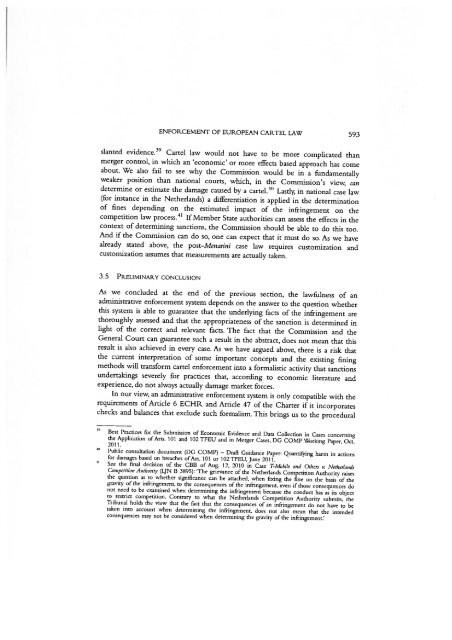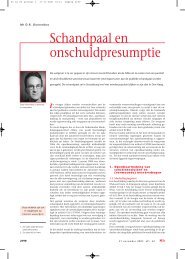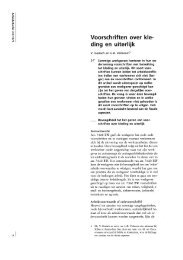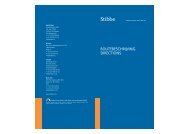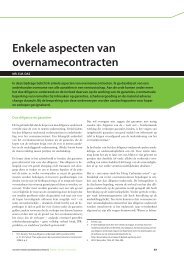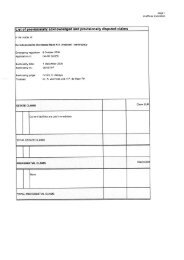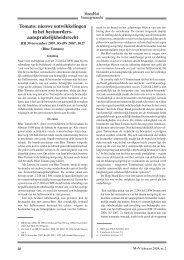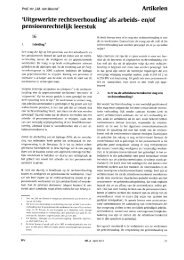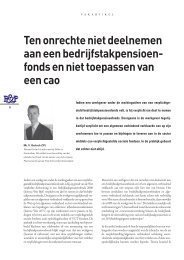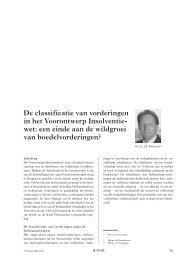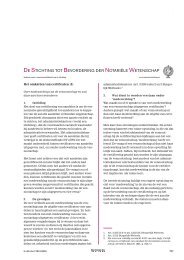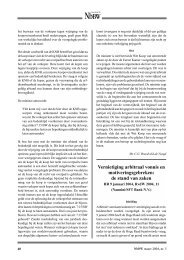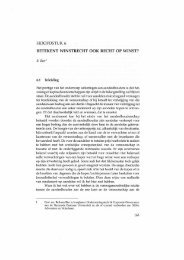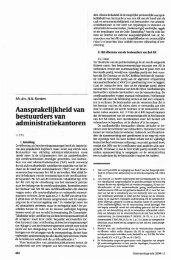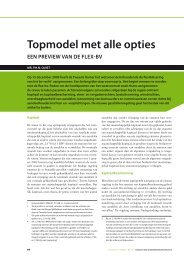The Lawfulness and Acceptability of Enforcement of ... - Stibbe
The Lawfulness and Acceptability of Enforcement of ... - Stibbe
The Lawfulness and Acceptability of Enforcement of ... - Stibbe
Create successful ePaper yourself
Turn your PDF publications into a flip-book with our unique Google optimized e-Paper software.
slanted evidence.<br />
39 Cartel law would not have to be more complicated than<br />
Tribunal holds the view that the fact that the consequences <strong>of</strong> an infringement do not have to be<br />
consequences may not be considered when determining the gravity <strong>of</strong> the infringement.’<br />
the Application <strong>of</strong> Arts. 101 <strong>and</strong> 102 TFEU <strong>and</strong> in Merger Cases, DG COMP Working Paper, Oct.<br />
2011.<br />
Guidance Paper: Quantifying harm in actions<br />
the question as to whether significance can be attached, when fixing the fine on the basis <strong>of</strong> the<br />
taken into account when determining the infringement, does not also mean that the intended<br />
See the final decision <strong>of</strong> the CBB <strong>of</strong> Aug. 12, 2010 in Case T-Mobile <strong>and</strong> Others v.Netherl<strong>and</strong>s<br />
to restrict competition. Contrary to what the Netherl<strong>and</strong>s Competition Authority submits, the<br />
not need to be examined when determimng the infringement because the conduct has as its object<br />
gravity <strong>of</strong> the infringement, to the consequences <strong>of</strong> the infringement, even if those consequences do<br />
Competition Ant/writ)’ (UN B 3895): ‘<strong>The</strong> grievance <strong>of</strong> the Netherl<strong>and</strong>s Competition Authority raises<br />
41<br />
for damages based on breaches <strong>of</strong> Art. 101 or 102 TFEU. June 2011.<br />
“<br />
“<br />
Public consultation document (DG COMP) —<br />
Draft<br />
Best Practices for the Submission <strong>of</strong> Economic Evidence <strong>and</strong> Data Collection in Cases concerning<br />
light <strong>of</strong> the correct <strong>and</strong> relevant facts. <strong>The</strong> fact that the Commission <strong>and</strong> the<br />
checks <strong>and</strong> balances that exclude such formalism. This brings us to the procedural<br />
methods will transform cartel enforcement into a formalistic activity that sanctions<br />
undertakings severely for practices that, according to economic literature <strong>and</strong><br />
experience, do not always actually damage market forces.<br />
requirements <strong>of</strong> Article 6 ECHR <strong>and</strong> Article 47 <strong>of</strong> the Charter if it incorporates<br />
result is also achieved in every case. As we have argued above, there is a risk that<br />
In our view, an administrative enforcement system is only compatible with the<br />
General Court can guarantee such a result in the abstract, does not mean that this<br />
the current interpretation <strong>of</strong> some important concepts <strong>and</strong> the existing fining<br />
thoroughly assessed <strong>and</strong> that the appropriateness <strong>of</strong> the sanction is determined in<br />
this system is able to guarantee that the underlying facts <strong>of</strong> the infringement are<br />
administrative enforcement system depends on the answer to the question whether<br />
As we concluded at the end <strong>of</strong> the previous section, the lawfulness <strong>of</strong> an<br />
3.5 PRELIMINARY CONCLUSION<br />
already stated above, the post-Menarini case law requires customization <strong>and</strong><br />
<strong>of</strong> fines depending on the estimated impact <strong>of</strong> the infringement on the<br />
(for instance in the Netherl<strong>and</strong>s) a differentiation is applied in the determination<br />
determine or estimate the damage caused by a cartel.<br />
competition law process.<br />
context <strong>of</strong> determining sanctions, the Commission should be able to do this too.<br />
4’ If Member State authorities can assess the effects in the<br />
40 Lastly, in national case law<br />
about. We also fail to see why the Commission would be in a fundamentally<br />
weaker position than national courts, which, in the Conmiission’s view; can<br />
merger control, in which an ‘economic’ or more effects based approach has come<br />
customization assumes that measurements are actually taken.<br />
And if the Commission can do so, one can expect that it must do so. As we have<br />
ENFORCEMENT OF EUROPEAN CARTEL LAW 593


